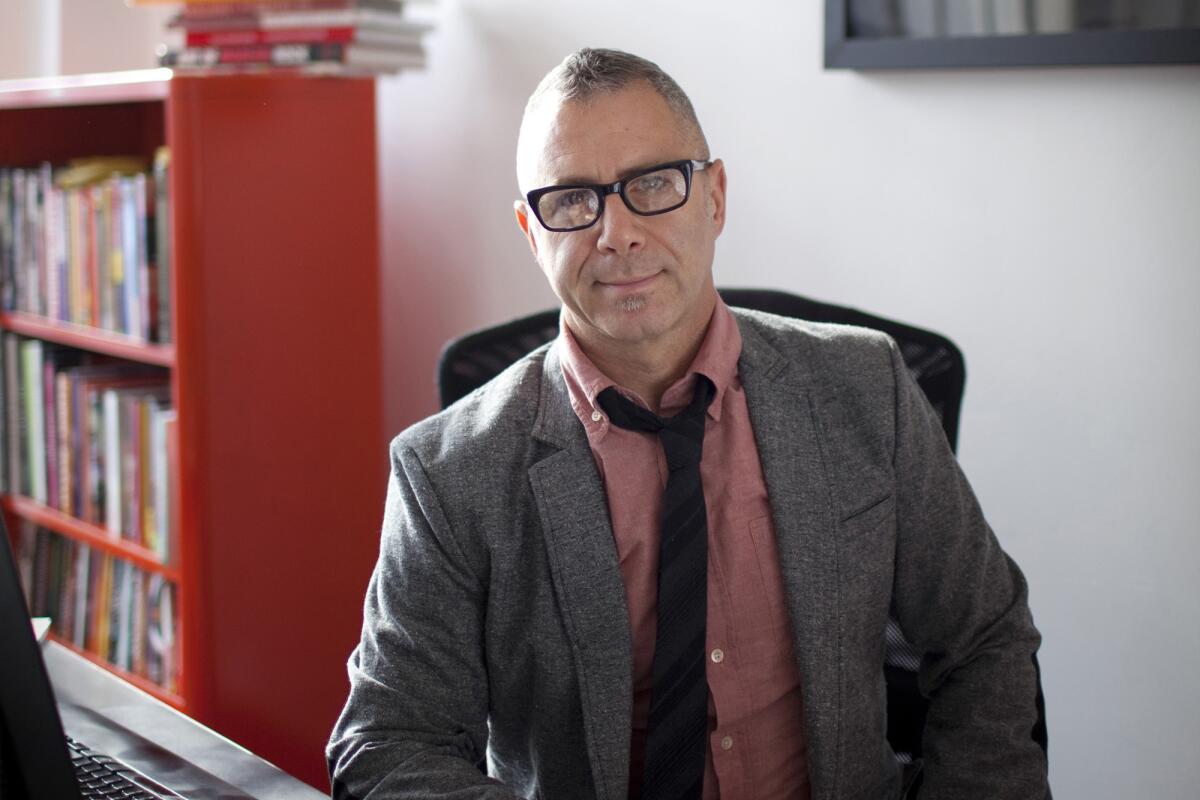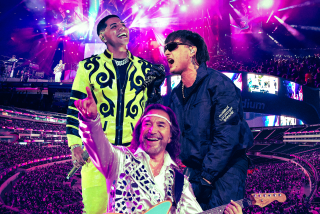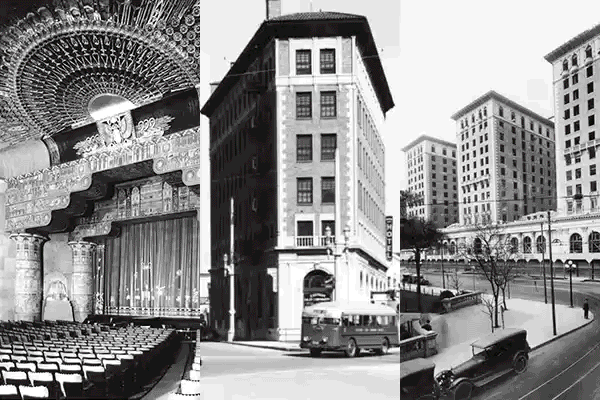Live music as a theme of downtown L.A.’s revival

The crowd that waited under the neon red glow of the Ace Hotel’s “Jesus Saves” sign came to see the experimental rock band Spiritualized. But as they filed into the Theatre at Ace, they became part of a different sort of resurrection.
Nestled in the 1920s-era building on Broadway that once housed Gene Scott’s televangelism empire, the Theatre at Ace’s Friday night opening was part of a rebirth for downtown Los Angeles’ music scene.
Live music was once a focal point of the area’s revival. Staples Center’s arrival in 1999, Walt Disney Concert Hall’s 2003 opening and the restoration of the Orpheum Theatre in 2001 were among the first signs that the neglected neighborhood was transforming.
PHOTOS: Spiritualized inaugurates Theatre at Ace Hotel
But attention soon shifted to successive waves of craft cocktail bars, high-end restaurants and fashion retail. The 2007 opening of the sleek but centrally planned L.A. Live (and its three music venues, the Nokia Theatre, Club Nokia and Conga Room) suggested that the future of downtown L.A. music might feel a little like Universal CityWalk.
Now the Theatre at Ace, which resides in the newly opened Ace Hotel on Broadway, and promoter Mitchell Frank’s soon-to-open Regent Theatre in the Old Bank District promise well-curated bills in historic, bespoke settings.
These venues are geared to the growing central city population (now more than 52,000). Just as crucially, they’ll attract music fans citywide, who will make a live show — one that’s in between Beyoncé in an arena and the Smell’s punky scene — the centerpiece of a night out downtown.
All over the Theatre at Ace, design details evoke the weird, only-in-downtown history of its varied occupants. The stage’s tapestry curtain still bears the original message “The picture’s the thing” from its United Artists days. Hotel guests enter through a lobby featuring whimsical pencil art from the Haas Brothers’ avant-garde design team, and female theatergoers will pass a burbling, mock-kitschy ceramic altar in the women’s washroom, crafted by the duo’s mom.
INTERACTIVE: Discover songs of L.A.
“We looked at properties all over L.A., but when we saw this theater we immediately knew its potential. The building was in amazing shape, we really just had to reupholster and change the carpet and [audiovisual] system,” said Kelly Sawdon, executive vice president of Ace Hotel Group. “We’re interested in everything, from film to art to concerts, and we’re so excited to bring this back to life and be a part of this neighborhood of theaters.”
While small clubs such as the Smell have long drawn adventurous young punks and Disney Hall gets an older classical crowd, these new spaces signal an audience of young residents for whom music is part of an urbane, walkable lifestyle.
The Spiritualized orchestral show is a perfect example of the kind of thing that Ace’s talent buyers — a mix of in-house and outside promoters like Goldenvoice and FYF — are looking for (they’re following it up with an engagement from choreographer Benjamin Millepied’s L.A. Dance Project).
Ace has experience in music production — the Palm Springs version is a popular DJ spot for Coachella festival artists, and the London Ace sports a small nightclub for rising acts.
This seated, ornate venue won’t work for every kind of act. But for an artist with a certain regal grandeur, it will be a one-of-a-kind performance space that could exist only in downtown L.A. in 2014.
“This theater connects us to the new downtown, which is such a unique place,” said Ryan Bukstein, director of marketing for Ace Hotels. “We want this to be the antithesis of a hotel where you could be anywhere. When you walk in, we want you to know that the only place in the world you could be is in the United Artists Theatre in downtown Los Angeles.”
A few blocks northeast, promoter Frank’s new Regent has more populist aims.
Frank’s stable of venues and club nights have transformed the neighborhoods around them. He helped make Silver Lake and Echo Park into indie-music meccas with nights and venues such as Club Spaceland, the Echo and Echoplex. He aims to continue that track record with the Regent, a space he’d been eyeing since 2006 (one just a few blocks away from his Mexican restaurant Mas Malo).
Frank has been rehabbing the century-old Regent in the Old Bank District (a space more recently used as a grindhouse theater for tawdry B-movies) for a planned opening this spring.
“My granddad was a vaudeville performer, and we think he once played in there,” Frank said.
Building code and construction delays had postponed its original planned opening. But the standing-room venue — with its mix of gothic and modernist designs and a sloped floor — will combine the Echoplex’s club-friendly bookings (which range from electronic dance music and major rock acts to reggae DJ nights) and the food-and-spectacle events his Spaceland Productions throws at the Natural History Museum and Santa Monica Pier.
PHOTOS: Unexpected musical collaborations
The Regent will have an attached restaurant and bars and will sport a regular weekly slate of live acts and DJs. The venue is significantly larger than his other properties, including the 350-capacity Echo and 700-capacity Echoplex.
Frank thinks that a mix of larger touring acts, a focus on downtown musicians (“We’ve gotten good at breaking local bands,” he said) and a goal to hire staff from the area and from local homeless-outreach work programs will keep the space full, while also staying respectful of its neighborhood.
If the Ace will be a home for special-occasion concerts, Frank wants the Regent to be a regular part of downtowners’ night-life regimen. It could be what the Echo complex is to Echo Park — a music venue local residents can visit on a moment’s notice, usually for less than $20 and sometimes for free.
“I want locals to be coming once a week,” Frank said. “We’re going to be competing with billion-dollar entities nearby, so we’re going to have to be creative and make locals feel welcome.”
The central city’s myriad bars and restaurant boom have attracted worldwide attention (GQ magazine recently published a long feature that called the area “America’s next great city”), and a spate of new high-end retailers like Acne and APC made it a fashion hub. All the attention could have led to a land grab in downtown that neglected local artistic life.
But the Regent and Theatre at Ace imply that the area is suited to become a centerpiece of music and culture as well.
PHOTOS: Best architecture moments of 2013
“Downtown L.A.’s music scene is on fire,” said Carol Schatz, president and chief executive of the Central City Assn. of Los Angeles and the Downtown Center Business Improvement District. “It’s a natural progression of what we’ve built here. It started with residential, then retail, and now we’re seeing the activation of all these old theaters. We’re marrying arts and culture and music.”
Even established bars and nightclubs in the area — which should include a renovated Globe Theatre this year — see this turn as more complement than competition. While L.A. Live is a self-contained entertainment space, these new venues could channel even more life back onto downtown streets.
Eduardo Castillo is co-owner of Pattern Bar, a Fashion District cocktail lounge with a revolving spate of electronica DJs. He also produces a popular dance-music concert series, Sunday Sessions, in downtown’s Grand Park. Pattern Bar is just two blocks from the Ace and five from the Regent.
For him, though, the new venues only cement downtown as the city’s preeminent night-life destination.
“What’s happening in downtown L.A. music is that people are really interested in curation,” Castillo said. “Our block has all these elements. You can stay at an amazing hotel, see a show, get a great cocktail and then finish off the night by buying a gold suit at Acne.”
If both new venues can live up to expectations and become tent poles of a new downtown live music culture, it won’t just bode well for fans living in and coming to the central city. It will help answer the question of what a rapidly evolving downtown will look like decades from now, when the grandkids of today’s venue-owners want to take in a live set.
“Just recently we had these beautiful girls I’d never seen before come in, and they stayed for the whole night. They said they couldn’t bring themselves to leave because of the music,” Castillo said. “It’s a joy to see what happens when you build proper venues in these beautiful spaces.”
More to Read
The biggest entertainment stories
Get our big stories about Hollywood, film, television, music, arts, culture and more right in your inbox as soon as they publish.
You may occasionally receive promotional content from the Los Angeles Times.











